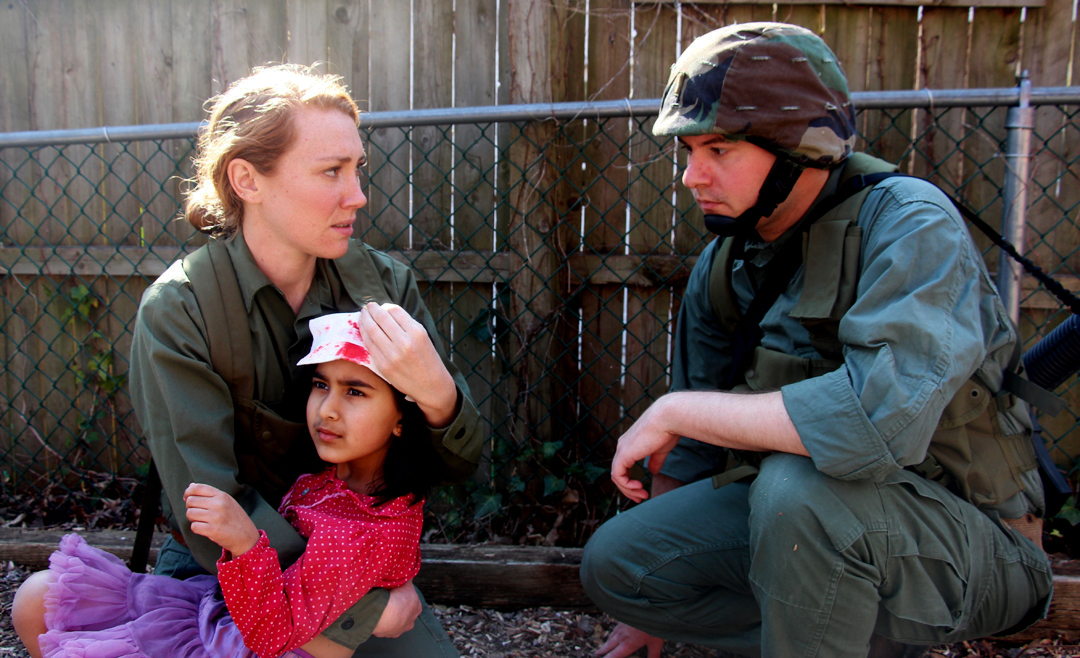Image from the play “It’s What We Do: A Play About the Occupation,” photographed by Jamal Najjab.
It’s What We Do: A Play About the Occupation
Directed by Pamela Nice
Capital Fringe Festival, 2017
Earlier this year, the Israeli Knesset passed a law barring “Breaking the Silence” from presenting in schools, universities, or any other non-profit institutions. The initiative to enforce a ban on the group came from Education Minister Naftali Bennett, who accused “Breaking the Silence” of denigrating the reputation of the Israeli Defense Force in the eyes of Israeli youth.
“Breaking the Silence” attempts to bring awareness about the realities of the Israeli occupation of Palestine to the Israeli public and the wider world. The organization collects the testimonies of IDF soldiers who have served in the Occupied Territories, testimonies that often detail the everyday ground-level cruelty of the occupation. Pamela Nice’s new play, “It’s What We Do”, has recently given this mission a valuable assist. The play, which recently completed an award winning extended run at the D.C. Capital Fringe Festival, takes the voices from Breaking the Silence and puts them into the bodies of onstage actors.
The play opens with a disembodied voice that enters into an almost therapist-style dialogue with three IDF soldiers, Sarah, Avram, and Ilan. Events unfold as the soldiers share the images, memories, and emotions that cannot be suppressed. Actors recreate scenes at checkpoints, pointless and arbitrary humiliations. Sarah describes how Palestinians would travel into Israel to buy inexpensive goods, and then be forced to leave those goods by the side of the road when a security warning went out. Palestinians would re-enter their lands while wearing multiple layers of newly purchased clothing as they weren’t allowed to bring bags of goods.
The soldiers tell of the so-called “separation barrier,” or apartheid wall, and how carving its path required the destruction of near-ancient olive groves that had sustained farm families for generations. According to Ilan, the contractors sometimes abandoned parts of the path, for whatever technical reason, rendering the destruction completely senseless.
The tense and emotionally heavy movement of the play through the various dimensions of the occupation climaxes in the recreation of a raid on a Palestinian home. At the height of the action, the stage lights go black, while the small auditorium fills with the sobs of children. The abstraction of the conflict – leaders, political parties and settlement accords – falls away, leaving the audience with the wounds that leave indelible scars, the reality of personal inhumanity, and the lasting pain and resentment of ordinary people. Sarah, Avram, and Ilan likely function as agglomerations of different soldiers and voices, but the regret and the pain of memory affect them all.
“It’s What We Do” reminds the audience that we cannot dismiss a military occupation as a few simple stats in a research paper or brief headlines on a news crawl. As Sarah describes it in the play, occupation functions as a machine with the purpose of disruption, harassment and the eventual elimination of a people. Nice’s play succeeds in giving the daily reality of oppression stark form, and proves well deserving of the Best Drama Award it received at the conclusion of the festival.
This article appeared in Al Jadid Magazine, Vol. 21, No. 73, 2017.
Copyright © 2017 AL JADID MAGAZINE

